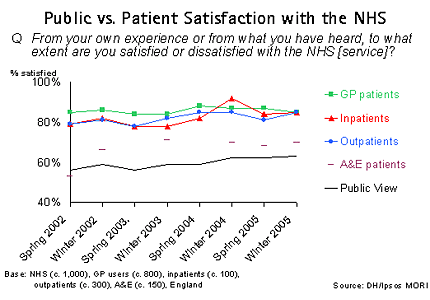Understanding Public And Patient Attitudes To The NHS
This year the Healthcare Commission is supplementing its annual State of Healthcare report on the "the provision of healthcare by or for NHS bodies" in England and Wales with a summary of NHS-related research published by Ipsos since 2000. This supplementary report looks at public and patient priorities for, and satisfaction with, a wide range of different aspects of the NHS. The report highlights key trends over the last five years, looks at regional and demographical differences, and summarises areas of change.
The British general public continue to view the NHS as one of the best of its kind in the world. Despite this however, in early 2006, levels of optimism about the future prospects of the NHS were at their lowest since 2002.
Although public opinion on long term prospects for the NHS is in decline other Research by Ipsos shows that public and patient satisfaction, (stable since 2000), is now showing signs of improvement. This is despite the impact of (often negative) media coverage and politics on the NHS at a national level, where people rely on media coverage to form judgement.

The report highlights that the public remain very concerned about funding the NHS and see this as the biggest issue facing the service. This is despite the fact that waiting times and waiting lists have been cut in recent years -- far more people in Britain still believe waiting times are increasing rather than falling.
Another factor influencing satisfaction levels are findings that suggest ethnically diverse and younger populations tend to be more critical of the NHS and individual hospitals. Therefore, some NHS trusts may find it much harder to satisfy their patients than others who are serving populations known to be more complimentary about how the NHS treated them.
It's not all bad news though; there is some evidence of rising satisfaction with the choice people get when they use the NHS. Nevertheless, there is still work to do in persuading the public to see reform, or a more plural system of provision, as being most needed.
The majority of the findings in this report are based on surveys of the general public conducted by Ipsos over the telephone or face-to-face. Additional context is also provided by some of Ipsos's qualitative research. The Healthcare Commission's Patient Surveys Programme employs postal methodology, and the results of the programme, therefore, cannot be directly compared with the findings presented in this report.
![]() Understanding Public and Patient Attitudes to the NHS pdf, 310KB
Understanding Public and Patient Attitudes to the NHS pdf, 310KB



